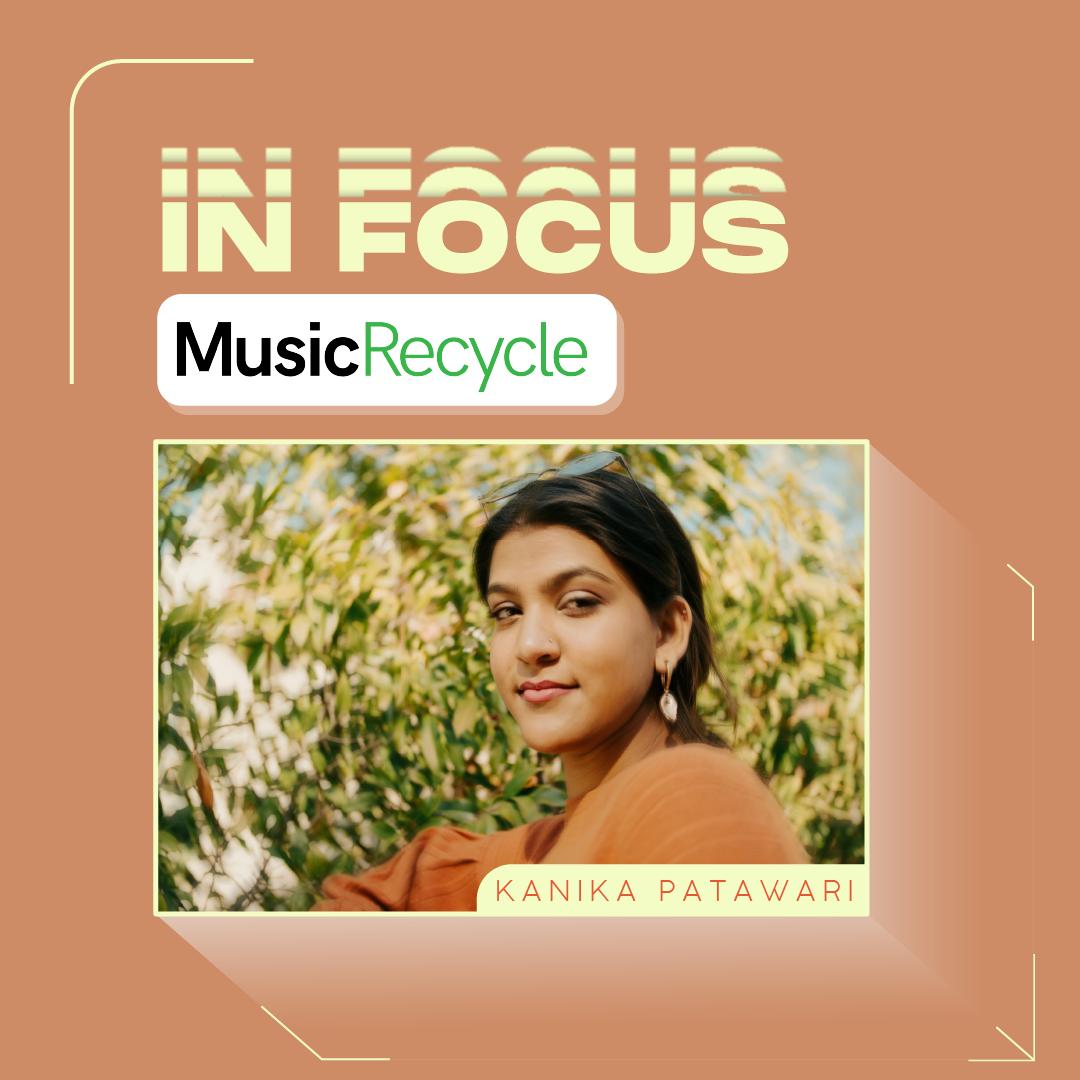
22 Jul In Focus – MusicRecycle
Musicians are positioned uniquely in our society to connect to large audiences and start conversations about pertinent yet uncomfortable subjects. Realising this fact early on and channeling into meaningful action is a woman of many talents- Kanika Patawari. Read on to learn more about her project MusicRecycle– an initiative aiming to educate, inspire and influence people to lead more environmentally conscious lives and reduce their carbon footprint.
Composed, articulate, and passionate, Kanika Patawari has the uncanny ability to light a spark in you and make you want to listen to what she has to say. A composer, producer, entrepreneur, and environmentalist, she is a dynamic and multifaceted woman. On this particular day, we sat down to discuss her passion project ‘MusicRecycle’- an initiative born from her growing concern for the state of the environment married with her long standing love for music. Providing a glimpse into her earlier years she says, “my family and my father started his recycling business over thirty years ago so that meant lunch, dinner, table conversations were about plastic, rubber, steel, metal, and all of that good stuff. I come from a family of businessmen and I was the one person who wanted to pursue music so I went to the Berklee College of Music and completed my degree over there.”
The shocking statistics about the deteriorating state of the environment caught her attention soon after graduating. “I had this moment in my conversations with my father about how I as a product of this family that has been a part of this industry myself could not really fathom and understand the gravity of how big of a deal this is which made me wonder how significant the lack of information is for the rest of the world.” Identifying the unique opportunity she had as someone who could work at the intersection of the recycling and music industries, she decided to get to work. “I realised that I have access to this entire network of people trying to solve this issue of climate change. At the same time, I had studied in music school in Boston, worked in LA and Bombay– the hearts of the music industry in these two countries. I thought that there must be something that can be done if we were to bring them together because music is a medium– it’s a way for us to talk about something where people are actually going to listen.”
MusicRecycle
“I see myself as the facilitator by providing both of these industries with what they want. For example, in the recycling industry they all want recognition and they want to be seen. They need help with promotion. On the other hand, musicians are looking for platforms, places to perform, show their talent and be a part of something they can use their voice on. What I am trying to do is find the gap in the music industry and connect it with this other side.” Having taken on the mammoth task of fighting climate change by raising awareness, Kanika is focussed on finding implementable solutions through meaningful conversations. “At the moment we are in conversations with instrument manufacturers. These people, like any other product manufacturers, have packaging and materials. There are so many things that they are consuming and using. We are having conversations with them to switch those things out and let us help you provide recycled plastic. A couple of years ago we started working with festivals. We started out in California at ‘Desert Daze Festivals’ by conducting a pilot experiment where we put up this experience called plastic surgery. It was created to be like a doctor’s visit where people walked in and filled out a form asking them how often they were using plastic in their life. We also had a pharmacy where you could walk through to pick up reusable items, and single use plastic free items. It was a fun way for people attending the festival to get involved in the conversation.”
MusicRecycle’s recent initiative, a collaboration between their team, composer Dhruv Goel, audio engineer Garry Purohit, and Splice, culminated in the creation of a sample pack called ‘recycling’ – one of the top thirty packs on the platform upon release. “We went to a metal recycling yard out here in LA, and Dhruv and Garry recorded a bunch of sounds that you hear when you’re at a metal recycling yard. The core idea was that one man’s trash could be another man’s instrument.” Albeit innovative, some might find it difficult to join the dots on how the creation of the sample pack made at a recycling yard in downtown LA contributes towards finding a solution to the biggest threat faced by our planet, climate change. Connecting the many smaller initiatives to the bigger pictures Kanika says, “it’s about trying to put the thoughts in your mind in a subconscious way so that when you see it, you think about it. I think the biggest problem with waste these days is that once you throw it away you don’t think about it. It’s out of your mind because it’s out of your sight. What we need to do is find a way to keep that loop going so once you throw it away, ask the question “where is it going?”
Tackling climate change is no small feat. What is clear in my conversation with Kanika is that despite the emotional curve balls faced in leading a project with the scope of MusicRecycle, she is driven by a sense of urgency and sustained by her drive to do better and do more. “Earlier today I saw a Financial Times article about how we are getting closer and closer to reaching that 1.5 degrees celsius temperature that we are not supposed to reach and today the news article was like we are five years away from that. These things are frightening and worrying. I am constantly learning something new with all the time, energy and space I give to this project and I see that with everyone who comes and collaborates with me. They learn a lot of new things by researching and being involved in this. At the same time it is also really nice to see how many people are participating in these conversations. There are a lot more people talking and making these changes on the regular than there were five years ago. It’s a combination of emotions and it’s difficult to manage sometimes but there’s so much that needs to be done.”
With current efforts being focussed in curating a zero-waste festival experience, Kanika is generous in sharing her tricks of the trade to minimise your carbon footprint as a musician. “A simple switch to do is with your merchandise. If you’re making t-shirts, stickers, or posters just take the extra ten minutes to see if there is a recycled version of it or a less resource intense version of the same thing because that in itself can make such a big difference. Just take the time to do the research and see if there is something better out there. As musicians you have so much of a larger impact on people than you think and you should maximise that to the fullest. It’s all in the simplest decision of choosing b over a because people are seeing what you’re choosing and in you making that consumer choice you’re making a really big impact. Our entire mission is founded on the fact that as musicians and as artists we have a very loud voice that we can use. People are listening to us and people are watching us- whether it’s one person, ten people or thousands. It’s about what you’re doing with that space. The important thing is the way you act by example so people are able to follow that. We are constantly thinking about what we can do to make change easy. As exciting as MusicRecycle sounds, it’s all about the little things by trying to get people to change their behavior.”
About Kanika Patawari:
Born and raised in Belgium, Kanika is an artist, entrepreneur, and environmentalist. Noticing the lack of women in her production classes at Berklee College of Music, she decided to learn every aspect of creating; from writing lyrics and melodies to production and mixing. As one of the original members of the Berklee Indian Ensemble, Kanika performed with A. R. Rahman, alongside the ensemble at the iconic Berklee concert in Boston. After graduating from Berklee, Kanika moved to Los Angeles where she worked at Syco Entertainment for a year, during which she helped scout, develop, and launch the boyband ‘PrettyMuch’. Currently, the Curator of the Navi Mumbai Hub, Global Shaper Community (World Economic Forum), Kanika has founded ‘MusicRecycle’, an awareness project for the environment. She is also creating a co-working space for musicians in India, allowing artists to record, perform, learn, and network.
Written by Senjuti



No Comments